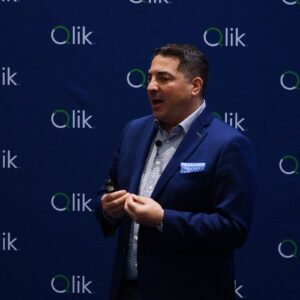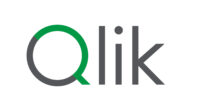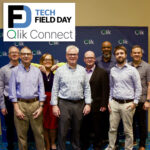|
|
 |
This Presentation date is May 12, 2025 at 12:30-16:30.
Presenters: Antoine Richard, Dave Channon, Josh Good, Kyle Jourdan, Luciane Ellis, Nick Magnuson, Ori Rafael, Piyush Bothra, Vijay Raja, Wale Oladehin
Qlik Connect 2025 Introduction
Watch on YouTube
Watch on Vimeo
At Qlik Connect 2025, Josh Good opened the event by laying out Qlik’s strategic vision and market aspirations. He focused on how Qlik is actively shaping its future, particularly over multi-year horizons, through a combination of AI, analytics, and market positioning. The company aims not just to solve traditional business challenges but also to impact societal issues such as poverty and logistics with its data-centric technologies. Josh highlighted recent achievements including the launch of Qlik Answers and Qlik Cloud, the global AI Reality Tour, and the acquisition of Upsolver, all of which underscore Qlik’s commitment to innovation and broadening their reach.
Josh also explored the market trends driving Qlik’s roadmap, particularly around the emergence of AI agents, the discernment between AI hype and applied value, and the importance of authenticity in data. He discussed how Qlik plans to integrate AI agents more fully into their product suite to allow for faster action from analytics and lower the effort required by users to extract value. Their new capacity-based pricing model reflects a more flexible and comprehensive user experience, enabling organizations to derive more from the platform. Furthermore, Qlik is positioning itself as an end-to-end solution provider by uniting its acquired technologies (like Talend and Attunity) into a seamless ecosystem that appeals to users looking to simplify their modern data stack.
Looking ahead, Qlik is doubling down on agentic AI and exploring new frameworks for enabling fast, actionable insights. Josh emphasized a future with multi-agent architectures and AI readiness, where agents handle core workloads and fluidly cooperate, possibly across ecosystems via protocols like MCP or A2A. The strategy also includes seamless embedding of AI, both predictive and generative, into Qlik’s products so users experience AI’s benefits without needing to understand the technicalities. Ultimately, Qlik’s platform flexibility, partnerships (such as with AWS), robust ecosystem, and investment-backed growth signal a confident path toward becoming a foundational AI-powered analytics provider for tomorrow’s digital enterprises.
Personnel: Josh Good
AWS and Qlik Strategic Collaboration Overview
Watch on YouTube
Watch on Vimeo
In this presentation at the Tech Field Day Experience during Qlik Connect 2025, AWS and Qlik elaborated on their long-standing partnership and how it has evolved to support modern data workflows and advanced analytics. They emphasized their decade-long collaboration, focusing on helping customers drive digital transformation through scalable cloud infrastructure and sophisticated data analytics. Joint customer success stories were shared to illustrate how enterprises, such as Vanguard, are leveraging AWS and Qlik to modernize critical systems — including SAP and mainframes — to enable near real-time data insights and enhanced operational efficiency.
The session highlighted the integration between AWS’s comprehensive infrastructure and Qlik’s advanced data analytics capabilities, particularly emphasizing Qlik Answers — a generative AI-powered data assistant. Powered by AWS services like Amazon SageMaker and Amazon Bedrock, Qlik Answers enables users to interact with their data through contextual and explainable AI-generated responses. The system architecture involves embedding user queries into vector databases using models like Cohere, with re-ranking and inference handled by Bedrock leveraging Anthropic’s Claude model. This ecosystem supports both structured and unstructured data access while maintaining transparency and traceability of responses, ensuring enterprise-grade security, privacy, and explainability.
Throughout the discussion, the presenters underscored the importance of flexibility, managed services, and shared responsibility in building secure AI applications. AWS’s three-tiered generative AI stack — infrastructure, foundational models, and managed APIs — provides customers and ISVs like Qlik with the tools and services needed to rapidly innovate while maintaining control over customization and data governance. Managed services are increasingly preferred by businesses aiming for faster adoption without sacrificing compliance, security, or accuracy. With AWS deeply committed to privacy, sovereignty, and model performance, and Qlik offering data integration from legacy systems to modern AI applications, this partnership provides a highly scalable and secure ecosystem for advanced analytics and decision-making.
Personnel: Piyush Bothra, Wale Oladehin
Qlik AI Strategy Overview and Agentic AI Deep Dive
Watch on YouTube
Watch on Vimeo
In this presentation from Tech Field Day Experience at Qlik Connect 2025, Qlik’s Nick Magnuson and Kyle Jourdan discuss Qlik’s strategic approach to artificial intelligence, focusing on integrating AI to solve real business problems with accuracy and trust. They explore how Qlik’s AI approach encompasses traditional predictive analytics, generative AI, and newer agentic AI paradigms—all within a unified, enterprise-grade ecosystem. The presentation emphasizes the evolution of Qlik’s AI capabilities, including the integration of structured and unstructured data within Qlik Answers, the expansion into autonomous agent actions, and the critical importance of customer-centric AI deployment.
In the session, Magnuson articulates Qlik’s AI philosophy, explaining how a pragmatic, use-case-first mindset underpins their strategy. Rather than blindly adopting large language models (LLMs) or generative AI for the sake of innovation, Qlik promotes applying the right form of AI—whether predictive, generative, or agentic—based on the specific business need. He shares concrete examples such as healthcare applications using predictive models to reduce patient no-shows and recover lost revenue, demonstrating how Qlik’s platform, bolstered by its acquisition of BigSquid and the resulting Qlik Predict, has delivered over a billion predictions. With Qlik Answers, initially a generative AI tool for unstructured data, now embracing agentic AI concepts, the platform can act autonomously on structured data, bridging the gap between conversational insights and actionable business operations.
The presentation continues with Jourdan providing a deep dive into the agentic evolution of Qlik Answers. He demonstrates how the system can handle natural queries, pull structured and unstructured data, generate visualizations, and take contextual actions such as sending messages or updating databases—all through a codeless, drag-and-drop interface. Advanced features such as explainability, AI trust scores, and the handling of lifecycle concerns like data governance and versioning are also discussed, emphasizing Qlik’s commitment to enterprise-grade standards. Moreover, Qlik’s neutral stance as an independent vendor provides flexibility for integration and multi-platform support, distinguishing it from hyperscalers with closed ecosystems. In closing, the session showcases upcoming tools like native time-series modeling and further automation integrations, reinforcing Qlik’s vision to empower users across technical skill levels to leverage the full power of AI responsibly and effectively.
Personnel: Kyle Jourdan, Nick Magnuson
Qlik Embedded Analytics and AI Deep Dive
Watch on YouTube
Watch on Vimeo
In their session at Tech Field Day Experience during Qlik Connect 2025, Luciane Ellis and Dave Channon explored the transformative impact of embedded analytics and AI on business applications. Emphasizing the increasing demand for real-time insights directly within workflows, the presenters highlighted how businesses are evolving past isolated dashboards to meet the expectations of both technical and non-technical users. The focus is now on integrating intelligence seamlessly into everyday tools like CRM or supply chain platforms, allowing users to get instant, context-aware insights without shifting applications. These embedded capabilities are proving valuable for independent software vendors (ISVs), who can now offer AI-augmented features such as predictive analytics and natural language interaction, translating into operational efficiencies and premium offerings for end customers.
As part of this transformation, Qlik has developed a suite of technology to support modern embedded analytics. Their Qlik Embed framework provides lightweight, cookie-free web integration and supports major frontend technologies, allowing applications to scale flexibly across multi-tenant SaaS architectures. Features like generative and predictive AI are natively integrated, enabling ISVs to deliver intelligent, hands-off experiences that vary based on user roles and access levels. These capabilities are not just limited to desktop environments but are essential for mobile use cases, such as logistics or retail operations, where quick, in-context insights are crucial. Moreover, Qlik emphasizes governance, security, and real-time user personalization, which are critical for enterprises and ISVs looking to deploy scalable, secure solutions.
To demonstrate the power and scalability of Qlik’s embedded platform, Dave Channon showcased a fictional ISV demo, Smart Chain. This end-to-end demo illustrated how quickly an isolated customer tenant can be spun up with full analytics, self-service dashboards, and AI-driven experiences wrapped within a single application workflow. The process included automated provisioning of data, users, apps, and assistants—all using Qlik’s rich API ecosystem and automation tools. The embedded analytics included customizable views, predictive insights, report generation, and visual interactivity—all accessible to users of varying roles and technical expertise. This approach, which combines centralized ISV-driven models with end-user-specific tuning, demonstrates Qlik’s flexibility and strength in delivering intelligent, user-centric, and scalable analytics solutions.
Personnel: Dave Channon, Luciane Ellis
Qlik Open Lakehouse Deep Dive
Watch on YouTube
Watch on Vimeo
In this session at Tech Field Day Experience at Qlik Connect 2025, Qlik unveiled and explored its new Qlik Open Lakehouse initiative, an outcome of the company’s acquisition of Upsolver. The presentation focused on the growing market adoption of Apache Iceberg, an open table format for data lakes, driven by its advantages in cost savings and interoperability. Ori Rafael highlighted the transition from traditional, tightly coupled data warehouses to decoupled data lakehouses using Iceberg. This shift enables enterprises to eliminate redundant warehouse storage costs by directly writing to cost-efficient object storage like Amazon S3. Furthermore, Iceberg allows customers to decouple compute from storage and use multiple analytics engines (like Snowflake for BI or Databricks for AI) on a unified data layer, enabling a truly open and flexible data architecture.
Qlik’s acquisition of Upsolver has enhanced its capabilities to deliver an enterprise-grade, high-performance lakehouse solution. The Qlik Open Lakehouse, now integrated into Qlik’s Talend Cloud platform, provides high-throughput ingestion, real-time processing, and automatic optimization of Iceberg tables. This includes features such as adaptive file compaction, dynamic partitioning, and efficient snapshot cleanup to keep storage lean and query performance high. Ori shared benchmarks demonstrating that Iceberg tables managed by Upsolver could achieve query performance nearly on par with native Snowflake storage, while offering as much as 2x improvement in storage efficiency over other Iceberg implementations. This level of performance addresses previous shortcomings of Hadoop-based data lakes and provides a practical, streamlined experience that doesn’t require specialized big data engineering expertise.
Antoine Richard and Vijay Raja elaborated on Qlik Open Lakehouse’s integration into Qlik Talend Cloud, detailing its core capabilities that support ingestion from hundreds of sources via batch or CDC, optimizer services tailored for Iceberg, and seamless mirroring into Snowflake without duplicating data. They outlined support for Iceberg catalogs like AWS Glue, Polaris, and Snowflake Open Catalog, enhancing query engine compatibility across platforms like Spark, Trino, and Dremio. The product roadmap includes enhancements like streaming ingestion, support for additional cloud providers, and advanced transformation tooling, reinforcing Qlik’s mission to provide an end-to-end data integration platform. A recorded demo concluded the session, illustrating how users can build data pipelines into Iceberg via Qlik Talend Cloud, view data in Athena or Snowflake, and perform seamless transformations, all while maintaining a familiar UI and minimizing the need for warehouse compute resources.
Personnel: Antoine Richard, Ori Rafael, Vijay Raja
Tech Field Day Experience at Qlik Closing Summary
Watch on YouTube
Watch on Vimeo
In the closing session of the Tech Field Day Experience at Qlik Connect 2025, Josh Good recapped key highlights from the event, emphasizing Qlik’s strong partnership with AWS, which supports robust cloud adoption and integration. He detailed the company’s AI-driven capabilities—including Qlik Answers, Qlik Predict, and agentic AI functions—highlighting how these tools enhance analytics and usability. Josh also showcased Qlik’s embeddable technology and advances such as the Open Lakehouse architecture and new AI-ready features like multivariate time series analysis and AI-assisted table creation. He underscored Qlik’s commitment to supporting clients’ transitions to the cloud while maintaining flexibility based on individual needs.
Personnel: Josh Good









